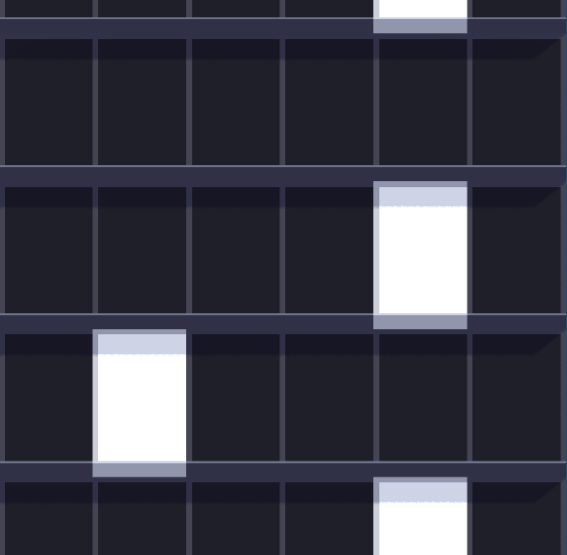Extreme Painist
 Extreme Painist by james1236 is a very hard version of Pianist where your goal is to survive 5 pieces separately as long as possible before losing or even possibly finishing the piece.
Extreme Painist by james1236 is a very hard version of Pianist where your goal is to survive 5 pieces separately as long as possible before losing or even possibly finishing the piece.
How to Play
The mechanics acts the same as Pianist but the tempo is high on those 4 pieces (300 BPM or 5 TPS with 6 columns on "Bach", 500 BPM or 8.333 TPS with 4 columns on "Boccherini", and 400 BPM or 6.667 TPS with 5 columns on "Mozart", "Beethoven", and "Debussy"), and theres a timer to see how long did you survive before making a mistake or finising this piece.
Strategies
As the game is nutoriously difficult because of some weird and long lines of notes in quick succession, there are lots of strategies to be used to help you.
Following the Tempo
Using these videos:
You can practice all the tempos you need, which is useful because you need to follow the rhythm in order to have a shot beating any piece.
Tapping Styles
There are 2 styles of tappings you can do that are so far viable to beating Extreme Painist, the 1st pose requires rest your hands on the surface and rest your index to the side of the phone/tablet, and use both your thumbs to tap, this is slower, but not too slow because you need to move your thumbs a bit, and slightly prone to missing because of these said movements, but its easy to learn them, and faster to master. The other pose is using both of your longest fingers and index fingers to tap those notes, which is slightly harder to learn and takes longer to master and is harder to perform in 5 columns or more, but its faster, and a bit less prone to missing because of the lack of movements, most professional Piano Tiles players actually use this technique at very fast tempos.
What are the Pieces Present?
Knowing the pieces are important as these can help you know what cues are there to handle and not take you by surprise, those pieces are:
- Badinerie by Bach
- Minuet by Boccherini
- Symphony No. 40 in G Minor (Molto Allegro) by Mozart
- Moonlight Sonata (Presto Agitato) by Beethoven
- Arabesque No.1 by Debussy
Improving your skills
Improving accuracy and timing
Stay as calm as possible, and try to memorize the piece well, with the rhytym in mind with the metronome practice. This is especially useful in "Bach", with the 6 columns, its tricky to aim the tiles correctly.
Improving reaction time
Memorizing the piece can help you know when the notes appear, and you can look ahead of the notes to give yourself more reaction time to these notes, this technique is especially useful in "Boccherini" with the high tempo.
Improving endurance
By using the index-thumb pose, and rest a bit after a few attempts, you can deal with long waves of notes really well, this is useful for End of "Bach", End of "Mozart", and the entirity of "Beethoven" because they have very long strings of notes at points and could tire out your hands and cause failure.
Weird Timings of Notes
Those pieces may have weird cues that can throw you off, which can be dealt with after dealing with those weird cues after a while.
Practice
Practicing those levels is the biggest key to beating those levels, it can improve a lot of the things mentioned above and makes it easier and easier to win.
Tackling "Debussy"
This piece is harder than any other piece due to it being obscure, having the same difficult traits as the previous pieces, and the fact that the notes are now set to 1/12 beat per row instead of 1/4 beat per row, meaning tiles could overlap, theres now a bit of luck involved as overlapping tiles will be harder to correctly execute, but enough practice could help you deal with double overlap or even triple overlap.